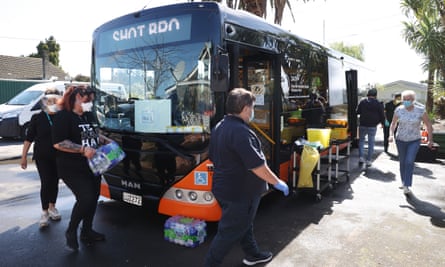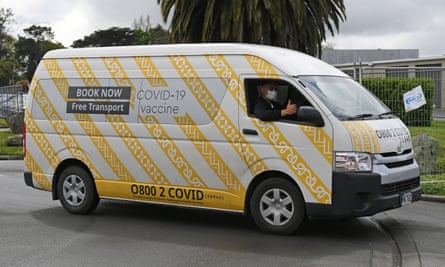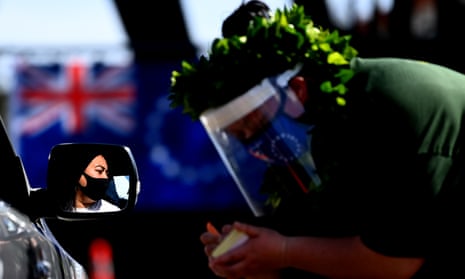You can do it in the cabin of a Dreamliner plane. You can do it at a race track. You can even do it in a fast food drive-through queue.
New Zealand’s government is employing a host of increasingly weird and wonderful strategies, gimmicks and sweeteners in a bid to get the last 20% of its eligible population inoculated against Covid-19.
As its daily Covid case numbers rise and large parts of the country are locked down, the government is in a race against time, trying to push vaccination rates high enough to interrupt the spread of the virus and prevent a large-scale outbreak.
The national airline, Air New Zealand, announced this week it would be converting a 787 Dreamliner into a novel vaccination clinic, complete with the traditional snack service and option of in-flight entertainment during the 30-minute post-vaccine observation period.
“People will board through the front door into business premier [class], where they will receive one dose of the Pfizer vaccine in their arm of choice,” the airline said in a statement. “They will then move through the cabin into economy, where a snack service will commence. While they wait to disembark after the observation period, Kiwis will be able to enjoy the in-flight entertainment.”

A spokesperson for Air New Zealand confirmed to the Guardian that those being vaccinated would be supplied with the airline’s traditional in-flight snacks – a biscuit, packet of corn chips or ice-cream – and would be required to wear a mask and socially distance while aboard.
The chief medical officer, Dr Andrew Connolly, said on Thursday: “For people to get vaccinated, it’s going to be: do they believe it in their hearts, do they believe it in their minds?”
The power of chicken
The key to winning those hearts and minds, a startlingly high number of health providers have decided, is chicken. At a Papatoetoe supermarket, punters were promised they would walk away with a hot roast chicken for every shot. Elsewhere, it was a family-size bucket of KFC for those peckish after a lunchtime inoculation, or across the country, the offer of a boxful of “popcorn chicken” nuggets.
So deep runs New Zealanders’ apparent love of fast food that the government has been in talks to send vaccination buses to offer shots at drive-through takeout queues. In Hamilton, McDonald’s customers could get a one-day special: a shot of Pfizer alongside their burger combo. In Christchurch, prospective vaccinees would be offered fish and chips from food trucks. Other locations provided king-size blocks of chocolate, supermarket vouchers or gelato.
Several vaccine clinics are also offering low sensory rooms, to make the experience a better one for those with autism, intellectual disabilities or sensory processing disorders. One Petone clinic hung green cocoons from the ceiling, and added squares of astroturf and faux fur to the walls to create a more gentle, quiet and tactile environment for clients who might otherwise get overwhelmed.
In Aotearoa’s farthest-flung places, Department of Conservation park rangers offered their services. The rangers typically devote their days to pest control and species management for native flora and fauna and have a network that stretches across the country’s most inaccessible regions. A department spokesperson said the rangers would use their fleet of off-road vehicles to transport people to vaccination hubs, with operations in the areas surrounding Te Kuiti and Taranaki, and were standing by to see if their assistance would be needed in other, more remote locations. Where it wasn’t, the rangers would be put to work manning sausage sizzles and baking cakes.

It’s not clear whether these kinds of incentives are enough to push the vaccine-hesitant over the line. Surveying by the University of Melbourne found only between 12% and 16% of Australians aged 18 to 49 who were previously unwilling or unsure about a vaccine would be swayed by a cash bonus. But the strategy may prove more effective for those who simply haven’t gotten around to it yet – and in a New Zealand context, every percentage point counts. As of Thursday, 81% of eligible New Zealanders – those aged 12 and over – had received at least one dose of the vaccine, while 59% were fully vaccinated.
More broadly, the initiatives are part of a wider push to give a communal, party atmosphere to the vaccination process – and perhaps avoid the grim politicisation it has undergone overseas. The authorities have come up with “Super Saturday” events focused on people proving harder to reach with vaccination drives, particularly Māori and Pasifika young people. This weekend, large-scale vaccination events will run into the night. The city of Nelson organised one vaccination event at the local speedway racetrack, with free speedway tickets. The Pasifika Youth Vax Fest in Porirua east promised live music and DJs.
The government has also launched a daylong “Vaxathon” modelled on the old-fashioned telethons of previous decades – and will live-broadcast the vaccination rates of regions to foster “healthy competition”, said the prime minister, Jacinda Ardern.
“New Zealand has been world-leading on keeping down our case numbers, hospitalisations and deaths,” she said on Wednesday. “I believe we can be world-leading on vaccines too.”
